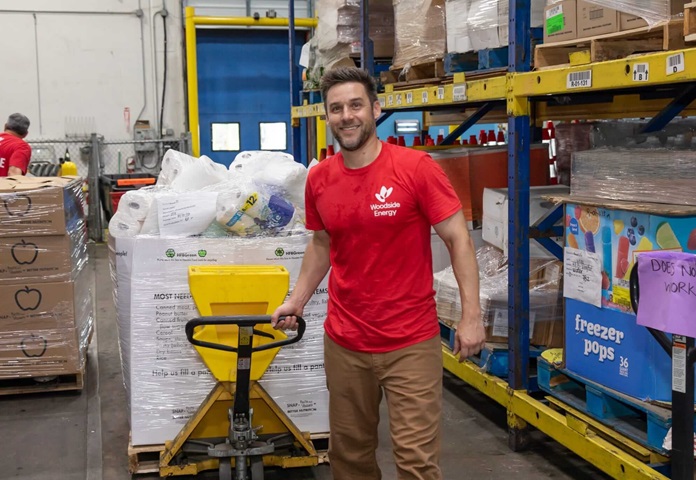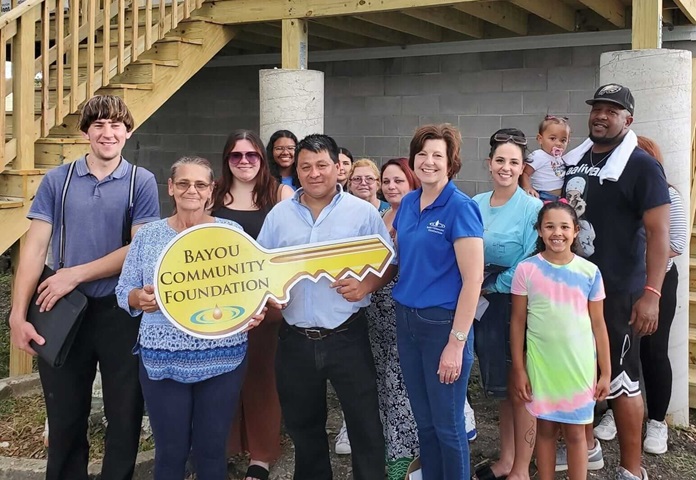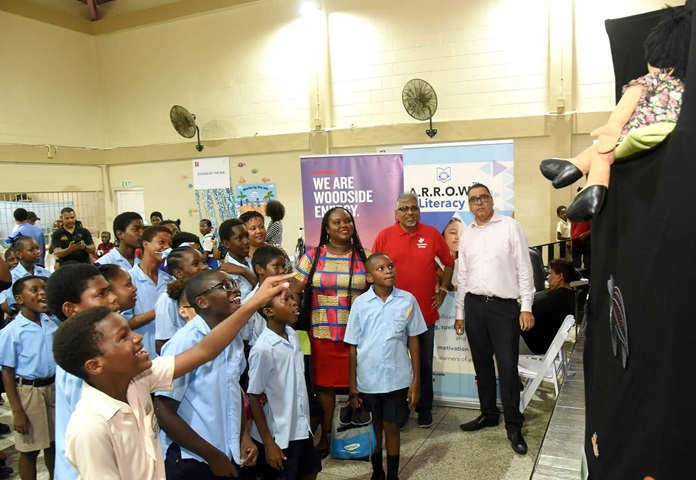TOTAL SOCIAL CONTRIBUTION SPEND GLOBALLY IN 2024
-
A$35.4 million
.tmb-ptitle-mob.jpg?sfvrsn=c8c5474b_3)
We strive to build and maintain respectful relationships that celebrate the culture and values of our host communities and generate positive social and economic outcomes.
Woodside acknowledges managing our activities in a sustainable way is fundamental to the wellbeing of our employees, communities and environment
We strive to build and maintain respectful relationships that celebrate the culture and values of our host communities and generate better social and economic outcomes.
The way we work is guided by our Policies, Social Performance Framework and Our Values. These documents set the expectations for how Woodside fosters respectful relationships, manages adverse impacts and creates opportunities.
Woodside seeks to identify, understand, manage and monitor potential impacts and opportunities associated with our activities.
Our Social Performance Framework guides our approach as we seek to build trust, share timely information about our activities and understand the expectations of the communities where we are active.
Social performance plans are updated annually in each community where we are active, including in the North West of Western Australia (Karratha, Roebourne, Exmouth, Onslow), United States Gulf Coast, Trinidad and Tobago, Mexico and Senegal. The plans support projects and operating assets to identify their social performance priorities and highlight social licence to operate risks and emerging trends. Woodside leaders endorse their relevant plan to ensure they are fit for purpose and reflect the nature, scale and impact of our activities.
Woodside tracks its performance against these plans by utilising a social performance dashboard updated quarterly and shared with leaders within Woodside. It includes the review of social performance, and considers emerging trends, community indicators and stakeholder sentiment. It is used to assist the business in understanding community needs and aspirations and growing knowledge of social performance priorities within our teams and employees.
As stakeholder expectations continue to evolve, ensuring the business is informed of the key social risks and opportunities is a key enabler to effective management and protection of our social licence to operate. Integrating and embedding social performance into strategy, processes and culture will be a continued focus throughout 2025.

Woodside’s community grievance framework is designed to facilitate prompt and respectful receipt, investigation and response to community concerns from stakeholders in our operational areas.
In 2024, our new grievance process was in operation. Our grievance mechanism continues to strengthen our alignment to the grievance effectiveness criteria outlined in the United Nations Guiding Principles. Updates to local community mechanisms and training to employees who manage community concerns were also completed in 2024.
We received 10 community grievances in 2024 from our operational and development areas. All grievances were addressed and discussed with relevant community members. There was no commonality with grievances, they ranged from weed management issues to payment terms, to relationships with subcontractors. The number of grievances in 2024 decreased by one from 2023. There were three local content grievances in 2023, with none reported in 2024.
Our framework is designed to increase awareness about the grievance process and evolving community expectations, while in 2024 Woodside had an increased focus on creating local opportunities.
More information on Woodside’s grievance process can be found on our Community Concerns page
In 2024, Woodside continued to support community development globally and invest in opportunities important to our host communities.
A$35.4 million
A$21.1 million
A$2.5 million
A$5.3 million
A$6.5 million
The 2021-2025 Social Contribution Strategy identifies three social outcome areas to enhance support for community development and focus on long-term outcomes. The three areas are: improve knowledge; create opportunities; and build resilience, with a common focus on environment, education, employment, and liveability outcomes. In 2025 we will be undergoing a process to develop the company’s 2026 to 2030 strategy which will be relevant across our global portfolio.
Demonstrating social impact outcomes continues to be a core consideration in how we shape new and existing social investment partnerships. The 2024 Social Contribution Impact Report will be released in 2025 and highlights outcomes and impacts, and progress against the United Nations Sustainable Development Goals.
Woodside has been a member of Business for Societal Impact (B4SI) for over a decade. The B4SI community investment framework and supporting guidance tools have helped to evolve our understanding and measurement of social impact through social investment. This has resulted in deeper engagement with our partner organisations to achieve meaningful and measurable impacts for the communities in which we are active. Feedback through the annual social impact measurement survey of partner organisations is highlighted below.
97 %
100 %
92 %
93 %
91 %
Woodside seeks to cultivate a workplace culture in which our employees are encouraged to give back to the community through volunteering and workplace giving programs. As one example, Woodside has partnered with Conservation Volunteers Australia for 15 years, supporting the vital rehabilitation of our wetlands and coastal sites.
In 2024, employees and their families contributed 1,432 hours to local conservation groups across Australia. We believe these opportunities not only make a genuine impact on the environment but also offer a positive experience for employees who participate. In a post-event survey, 100% of employees expressed a desire to educate and support their family and friends in reducing their environmental impact.
In addition to Conservation Volunteers Australia, our people are also able to contribute their time and financially to the community through Volunteering WA and United Way. In 2024 our people contributed 15,200 hours valued at A$5.3 million3 to community volunteering and donated A$2.5 million to community programs.
.tmb-v2-card.jpeg?sfvrsn=63cd1e14_1)
The Ningaloo region is recognised as an area of high ecological importance with unique environmental, social and cultural values. The Ningaloo Reef is Australia’s largest fringing coral reef, extending across 280 kilometres of coastline between Exmouth and Carnarvon, Western Australia.
To better understand and manage the environmental features of the region, Woodside has supported a range of multi-year projects.
Ningaloo Outlook – Turtle Education Program, CSIRO. Credit: Violeta J. Brosig from Blue Media Exmouth.
-web.tmb-v2-card.jpeg?sfvrsn=e714386e_1)
For more than 15 years, Woodside and its Joint Venture participants have proudly contributed to the Karratha and Roebourne Education Initiative (KREI), a partnership with schools within the City of Karratha in the North West of Australia. The partnership seeks to enrich educational opportunities and foster better outcomes for local students.
Roebourne District High School is one of the long-standing participants of the KREI.

The United Way of Greater Houston creates opportunities for people to improve their wellbeing through financial stability, health care and youth programs.
Woodside has partnered with United Way for numerous years, hosting an annual campaign for employee fundraising and volunteering opportunities at United Way agencies.
In 2024, the theme, ‘Go the Extra Mile’, highlighted the importance of going above and beyond to assist the Houston community, ensuring they receive necessary support.

Woodside supports the Bayou Community Foundation’s Grants Program in its efforts to address critical humanitarian needs in Lafourche, Terrebonne and Grand Isle parishes in southern Louisiana, USA. The investment by Woodside enables local non-profit organisations to deliver essential services to the most vulnerable residents in these communities and provides necessary funding to food banks and distribution of basic essential supplies through programs catering for children, the elderly and families.
-web.tmb-v2-card.jpeg?sfvrsn=9216bf8_0)
Since 2023, Woodside has embarked on a meaningful collaboration with Tecnológico de Monterrey (ITESM), one of Mexico's most prestigious educational institutions through its ‘Leaders of Tomorrow’ program.
This initiative identifies women from Tamaulipas who exhibit strong leadership qualities, demonstrate academic excellence, and have a keen interest in pursuing engineering or science degrees, but face financial barriers to access education.

Woodside collaborates with the ARROW Foundation and the Trinidad and Tobago Ministry of Education to run a successful literacy program benefiting over 350 students from 13 primary schools in north-east Trinidad.
The primary goal of this partnership is to enhance the reading and writing skills of these students, equipping them with increased confidence and focus.
-web.tmb-v2-card.jpeg?sfvrsn=d435cb14_1)
In 2024, Woodside and social investment partner PanAfricare, celebrated further success of the Integrated Project for Environmental Management and Sustainable Asset Development.
Established in 2021, this initiative is bringing positive changes to communities in 13 coastal areas of Dakar and Thiès in Senegal.
Woodside has a longstanding relationship with the Harry Perkins Institute of Medical Research in Western Australia, supporting its annual Cancer 200 Ride for the Perkins, a 200km two-day ride that raises funds for cancer research.
In 2024, the 13th year Woodside employees have participated in the ride, an impressive A$208,708 was raised by ‘Team Woodside’.
Woodside continues to work with our suppliers across the global supply chain to continuously improve our approach to make opportunities more accessible and deliver sustainable outcomes to our communities.
Woodside contributed towards building thriving local communities by creating opportunities for individuals, First Nations peoples, local and diverse businesses to share in our success. We recognise the drivers and community expectations for local content contracting differ across our global portfolio of projects and operating assets, and we tailor our strategies and processes aiming to maximise supply chain outcomes whilst incorporating local content needs.
We have embedded Local Content reporting tools to capture and understand the impact we are having in our local communities. Our approach to supply chain and local content supports the delivery of the Sustainable Communities Policy, Human Rights Policy, First Nations Communities Policy and our commitment to First Nations reconciliation.
In 2024, we spent more than US$7.9 billion on goods and services, with the majority being in Australia, the United States, Senegal, the United Kingdom and the Republic of Korea.
Work continued to provide increased visibility to local and diverse suppliers of contracting opportunities within our global operations and portfolio of future projects. This included targeted supplier engagement workshops, supplier development programs, local buying programs and networking events with our key contractors along with multiple internal workshops to ensure continued engagement with local and diverse suppliers. This was in addition to the information made available in our forward work plans.
Click on each of the following topics to view more about it.